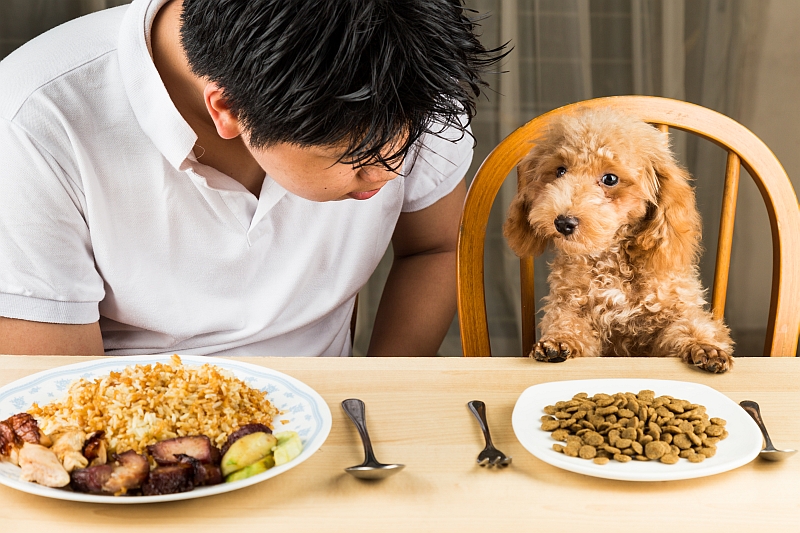Sneaking a dog scraps from the dinner plate is a practice humans have done for years. Why? Because dogs are eager eaters! Their expressions are so charming, and they genuinely seem interested in anything that smells aromatic from the table, the kitchen counter, or from the pantry. Dogs know they are hard to resist, and we often fall prey to the idea that “a little couldn’t hurt!” This is sadly not the case, since many human foods are quite harmful and dangerous for dogs to eat. So, if you’re a pet-owner who likes to share his dinner with the pup, here are some key safety tips to be aware of while feeding a dog human food.
Keep it clean. We love syrupy gravy and savory sauces, but these can be hard on canine stomachs. Toppings often have garlic and onion in them, which are not good for dogs. So if you are going to fork over some of your meat, make sure it is seasoning-free.
Give them veggies and grains. Though a dog’s first inclination might be toward the hunk of turkey on your plate, rather than the cooked carrots, remember that your pooch is an omnivore. Dogs need vitamins through vegetables and fruits, so when you pile a stack of snacks from lunch, make sure there is a good variety of fruits, veggies, and grains along with the protein source. (Not all berries, roots, fruits, and vegetables are puppy-approved, so be sure you know what is safe to feed your pet. For a list of safe fruits and veggies to feed the dog, check out this list.
Forget the fat and bones. In the wild, canines would eat the skin, bones, muscle, and cartilage of their prey. While these components are good for dogs in some capacity, it can be dangerous for a dog to bite into a side of salmon, and accidently swallow the bones, or get them caught in between his teeth. Likewise, though fat is a tasty snack for dogs, eating too much of it can cause digestive issues and pancreatitis. Try to avoid filling your dog up on animal fat and skin, as well as cream and butter.
Feed them age-appropriate snacks. Children are discouraged from caffeine and elderly people often have to watch their salt/sodium intakes. The same kinds of age-limitations apply to pets, because puppies have different nutritional requirements than senior dogs do. When you are giving your dog human food, double check that the nutrients on the plate are beneficial and not detrimental for his age.
Limit the food sharing. While it is completely fine to share human food with your pets (provided the items are safe for dogs to eat) doing so too often is a bad idea. More snacking, means higher calories, overfeeding and weight gain. Pet obesity is a serious problem in the United States, and one of the ways you can avoid letting your pet get heavier, is to watch how often you give him scraps.

